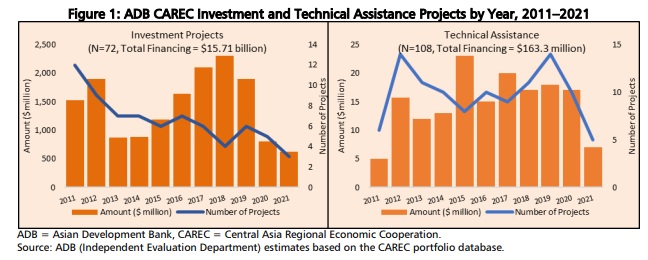ADB Helps Connect Central Asian Countries — Independent Evaluation Report
The Asian Development Bank (ADB) has helped advance transport and energy connectivity among member countries of the Central Asia Regional Economic Cooperation (CAREC) Program, but progress on improving regional economic competitiveness, trade, and the supply of regional public goods in the subregion has been more limited, according to an independent evaluation report released.
The report assessed ADB’s support for the CAREC Program from 2011 to 2021, which aimed to promote regional cooperation and integration (RCI) across 11 countries, comprising Afghanistan, Azerbaijan, the People's Republic of China, Georgia, Kazakhstan, the Kyrgyz Republic, Mongolia, Pakistan, Tajikistan, Turkmenistan, and Uzbekistan.
“The subregion is one of the least integrated in the world, with more difficult preconditions for RCI than other developing regions,” ADB Independent Evaluation Department Director General Emmanuel Jimenez said. “However, it also has an enormous potential for RCI, given its strategic location as a land bridge connecting some of the world’s significant and fastest-growing economic centers.”
The report found that the CAREC Program exceeded its transport output targets, covering investments in roads and railways. ADB’s support has increased the quality of travel, travel speeds, and traffic volume along the transport corridors. Energy connectivity across some countries also improved and will continue to increase as projects are completed and commissioned.
However, progress in regional economic competitiveness has been modest, due to continuing challenges in removing nontariff barriers to trade. “ADB's support in the area of regional public goods is still relatively new, and there is a continuing need for institution and consensus building across CAREC member states,” evaluation team leader Houqi Hong said.
The program has generally appropriate strategies and instruments in place to deliver its primary objectives. However, as it expands into non-infrastructure sectors and areas of critical global and regional public goods, such as climate change issues, the program may put pressure on existing staff and constrain technical assistance resources in the near future.
To improve future performance, ADB should strengthen support for investment climate and trade policy reforms, modernize border crossing points and customs processes, develop multimodal transport corridor networks, scale up climate change mitigation and adaptation, and apply better results monitoring, the report added.

About Independent Evaluation at ADB
ADB's Independent Evaluation, reporting to the Board of Directors through the Development Effectiveness Committee, contributes to development effectiveness by providing feedback on ADB's policies, strategies, operations, and special concerns in Asia and the Pacific.






















































First, please LoginComment After ~